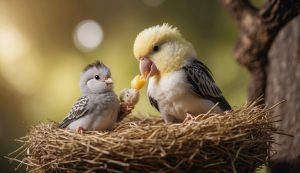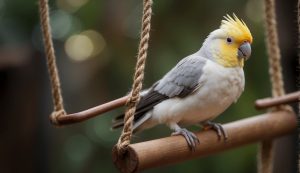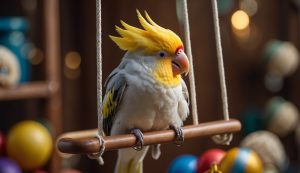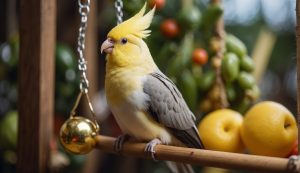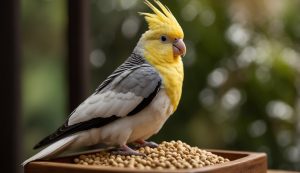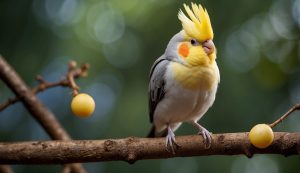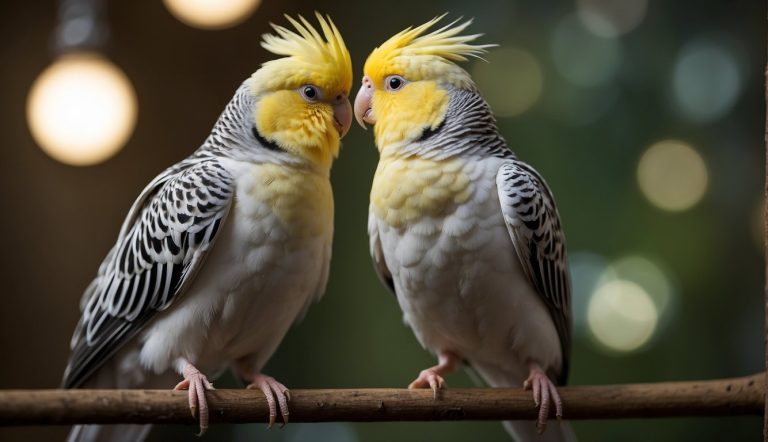How Long Can a Cockatiel Go Without Food? Understanding Your Pet’s Dietary Needs

Caring for a cockatiel involves understanding its dietary needs, which are crucial for its survival and well-being.
Among the many concerns that pet owners may have is the question of how long these birds can go without food. The answer is not straightforward as it depends on several factors, including the bird’s health, age, and environment.
However, it is important to note that cockatiels have a fast metabolism and generally need to eat daily.
In the absence of food, their health can quickly deteriorate, which makes monitoring their food intake and addressing any feeding issues a critical aspect of their care.
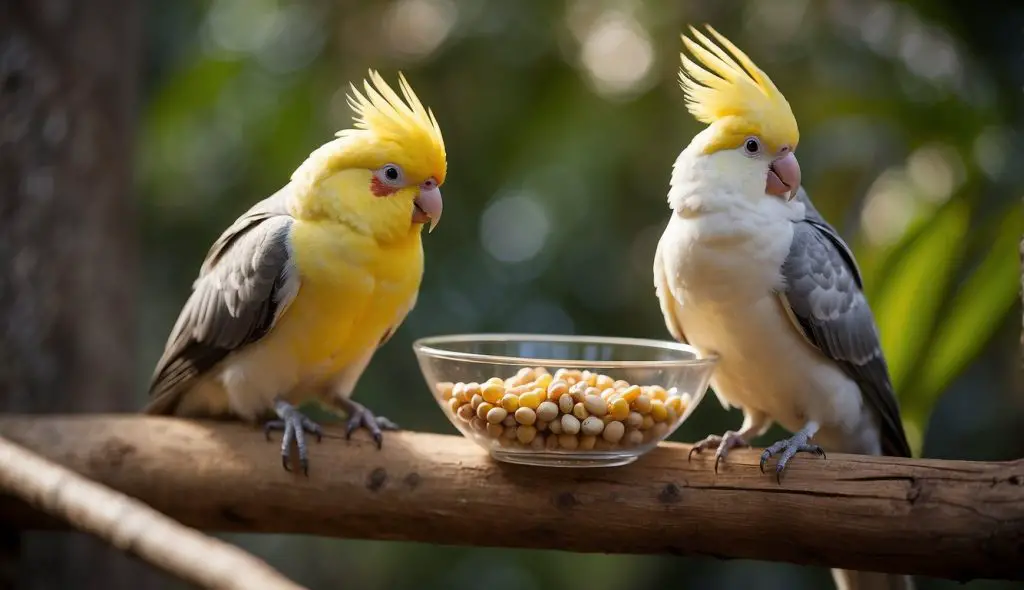
To ensure the longevity and happiness of your feathered friend, it’s vital to be aware of their specific needs and behaviors when it comes to nourishment.
A varied diet that includes seeds, pellets, fruits, and vegetables, alongside a consistent feeding routine, is the bedrock of sound cockatiel care.
Recognizing the signs that your bird is not eating properly, either due to illness or pickiness, is also paramount.
Key Points
- Cockatiels require daily food intake due to their fast metabolism.
- A balanced diet and consistent feeding routine are essential for cockatiel health.
- Identifying and addressing feeding issues early can prevent health problems.
Table of Contents
What Are Your Cockatiel’s Dietary Needs?
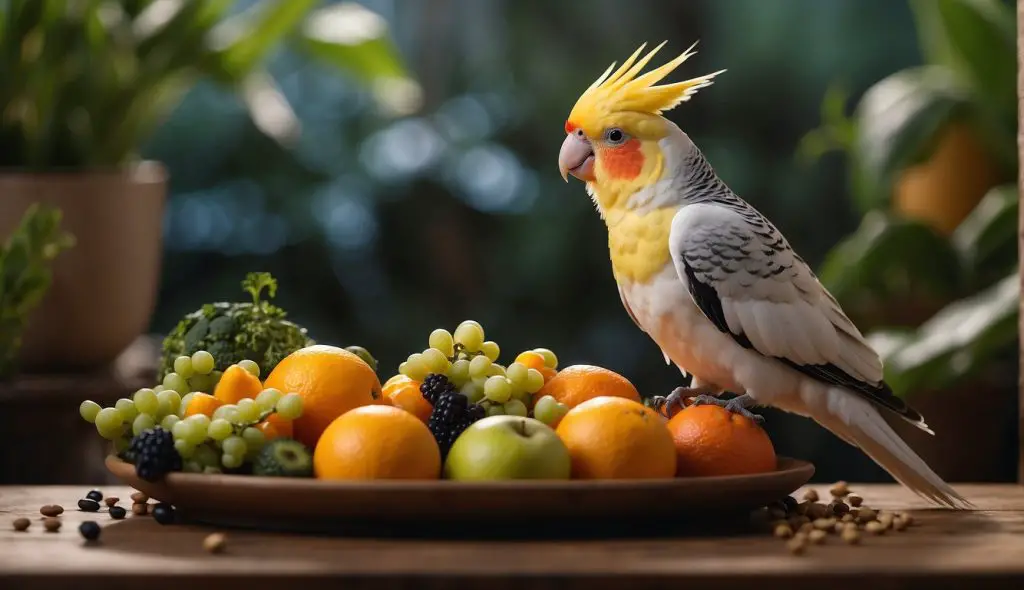
I believe it’s essential for a cockatiel owner like you to understand the specific dietary needs of your feathered friend to ensure they lead a long and healthy life.
Essential Nutrients and Balanced Diet
Cockatiels require a variety of foods to provide all the necessary nutrients for their health. A balanced diet is critical and should include:
- Seeds: A mix but not solely, as seeds are high in fat.
- Pellets: Formulated pellets should account for about 60% of their diet as they are nutrient-rich.
- Vegetables: Dark, leafy greens and other veggies should be offered daily.
- Fruits: Only in small amounts due to high sugar content.
While cockatiels have high metabolisms and benefit from a variety of foods, their diets must not be heavy in fat. Also, always ensure fresh water is available.
Age-Specific Food Requirements
- They need a high-protein diet for growth.
- Hand-feeding formula is often used until they can eat on their own.
Adult Cockatiels:
- Require a well-balanced diet that’s lower in protein than what’s needed for babies.
- Constant monitoring of their food intake is necessary for their development and to prevent obesity.
Being mindful of both the variety and the type of food you offer your cockatiel, no matter their age, will play a significant role in their overall health and well-being.
The Effects of Food Deprivation on Cockatiels
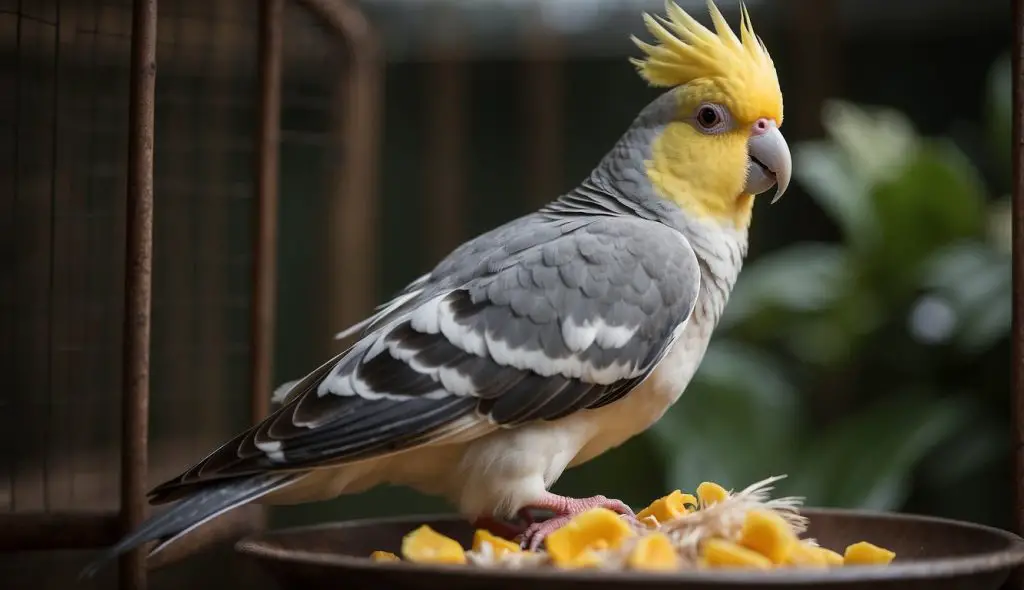
When discussing how long a cockatiel can go without food, it’s crucial to understand the serious implications that food deprivation can have on their health and behavior.
Health Risks Associated with Starvation
Starvation and severe weight loss present serious health risks for cockatiels. Lacking regular access to food, my cockatiel could experience a variety of physical health issues:
- Dehydration: Without food, the risk of dehydration increases significantly, as they receive part of their water intake from their diet.
- Malnutrition: Essential nutrients deficiency will lead to malnutrition, which can result in weakened bones and even lead to long-term health problems.
- Lethargy and lowered energy levels: Food provides energy, and without it, my cockatiel would quickly become inactive and lethargic.
- Weakened immune system: A consistent lack of food can weaken my cockatiel’s immune system, making it more susceptible to illness.
Behavioral Changes Due to Hunger
Hunger can also trigger noticeable changes in a cockatiel’s behavior. Some of the behavioral shifts I might observe in my cockatiel under prolonged hunger include:
- Increased anxiety and stress: My cockatiel could become more anxious and show signs of stress, such as feather picking or incessant chirping.
- Altered vocalization: A change in the frequency or tone of my cockatiel’s vocalizations could indicate discomfort or distress due to hunger.
- Aggression toward cage mates: If housed with others, my cockatiel may display increased aggressiveness as a result of competition for scarce resources.
- Shift in normal behaviors: Daily routines may change, with my cockatiel possibly showing a decreased interest in activities it usually enjoys, or an increased obsession with seeking food.
Proper Feeding Practices for Cockatiels
As a dedicated cockatiel caregiver, I know the importance of proper feeding practices. It’s essential to ensure that my little feathered friend thrives on a consistent routine and proper diet.
Creating a Consistent Feeding Schedule
I always stick to a consistent feeding schedule for my cockatiel. Typically, I provide meals twice a day — once in the morning and once in the evening.
Fresh food and water should be available at these times. For my cockatiel’s hydration needs, I make sure fresh, clean water is accessible throughout the day, and I change it daily to prevent contamination.
Choosing the Right Food Bowl
Selecting the appropriate food bowl is just as crucial as the diet itself. I use a shallow, heavy bowl that my cockatiel can’t tip over, ensuring that the food stays clean and uncontaminated.
Proper placement of the food bowl is vital too; it should be placed at a reachable height and away from the perch to avoid droppings.
For the water bowl or bottle, I ensure it is cleaned daily to provide my cockatiel with fresh, clean water at all times.
In terms of diet, I balance between seeds, pelleted seeds, and fresh fruits and vegetables.
While cockatiels do love their seed mix, a diet consisting solely of seeds can lead to nutrient deficiencies and obesity. Therefore, I enrich my cockatiel’s meals with a variety of fresh foods to promote optimal health.
It’s important to note that the food requirements for cockatiels can vary, so I monitor my bird’s intake and adjust portions to meet their needs without overfeeding.
Recognizing and Responding to Feeding Issues
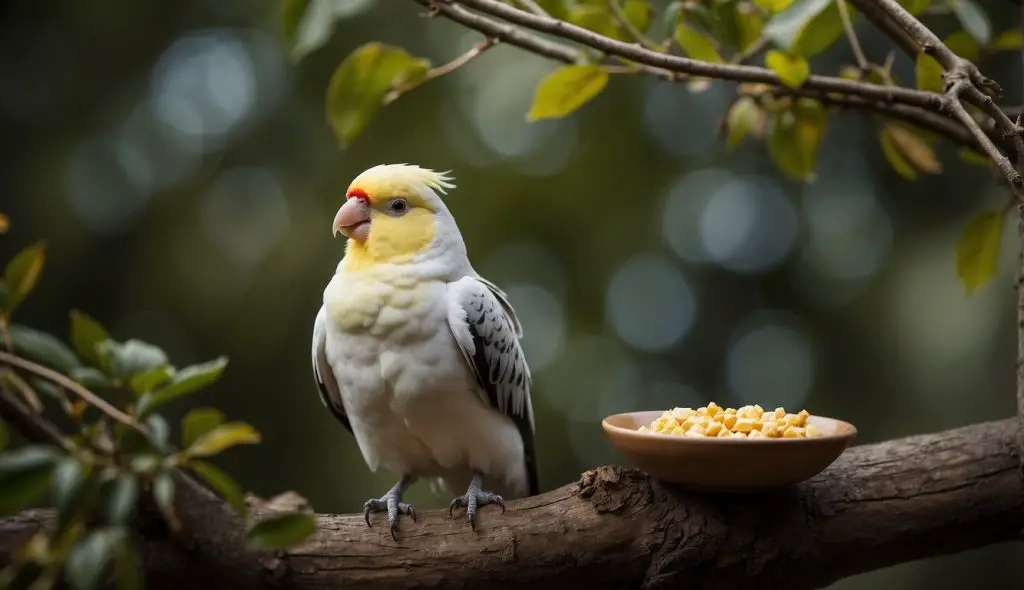
As a cockatiel owner, I understand that ensuring my pet bird receives adequate nutrition is critical for its health and well-being. It’s essential to be vigilant about feeding issues as they can lead to serious health problems and even death.
Identifying Signs of Improper Nourishment
I always watch for signs that my cockatiel might not be receiving proper nourishment. Changes in behavior, such as reduced activity levels or a lack of vocalization, can be indicators that something isn’t right.
I also pay attention to physical signs, which include:
- Weight loss: If I notice my bird is becoming lighter or its keel bone (the bone that runs down the center of a bird’s chest) becomes more prominent, it’s a red flag.
- Feather quality: Poor nutrition often results in dull, ragged feathers or excessive molting.
- Droppings: Changes in the color, consistency, or frequency of droppings can indicate a problem.
I make sure to monitor the food bowls in the cage to ensure my cockatiel is actually eating the food I provide from the pet store or my vet’s recommended diet.
When to Consult an Avian Vet
If I observe any of the above symptoms, or if my cockatiel has not eaten for 24 hours, I take immediate action by consulting an avian vet.
Cockatiels, like other pet birds, cannot survive without food for long, as they need a regular intake of nutrients to maintain their immune system and overall health. Prolonged food deprivation can lead to severe health issues such as kidney failure. Here’s what I keep in mind:
- Veterinary visit: I schedule an appointment with an avian vet if my bird has not been eating regularly.
- Emergency signs: Immediate signs of distress, such as labored breathing or lethargy, warrant an urgent visit to the vet.
Frequently Asked Questions
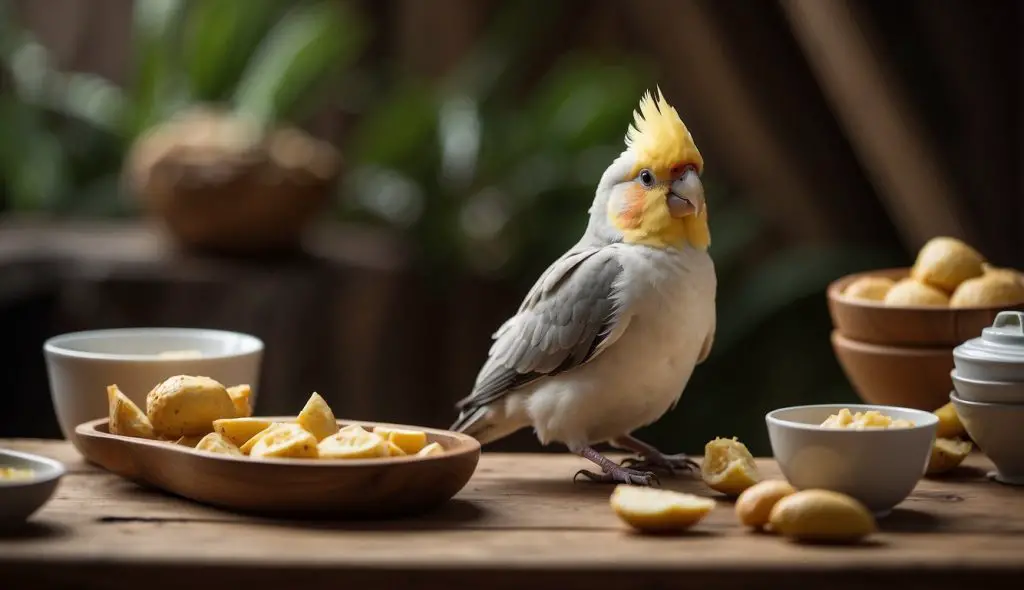
In this section, I’ll tackle some common concerns regarding how long a cockatiel can go without food and how to properly care for your pet’s dietary needs.
What is the maximum number of days a cockatiel can survive without food?
A cockatiel should never be without food for more than 48 hours. After two days without eating, immediate veterinary attention is necessary as this can become life-threatening.
How frequently should I feed my cockatiel to ensure its health?
I feed my cockatiel twice a day, providing a mix of seeds, pellets, and fresh fruits or vegetables. Consistent daily feeding times help maintain their health and happiness.
What should I do if my cockatiel stops eating?
If my cockatiel stops eating, it’s crucial to consult with a vet as soon as possible. Loss of appetite can indicate illness, so prompt attention is required.
Is it safe to leave my cockatiel alone for an extended period, and how does this affect its feeding?
I never leave my cockatiel alone for more than a day. If I must leave home for an extended period, I ensure someone can check on and feed my bird.
This prevents hunger and stress.
What are the signs that my cockatiel is not getting enough food?
Signs that my cockatiel isn’t eating enough include weight loss, lethargy, and changes in droppings. Observing these signs should prompt a visit to the vet.
How does the food intake of a baby cockatiel differ from an adult?
A baby cockatiel needs to be fed more frequently than an adult. They are typically fed every 2-3 hours during the day. As they grow, the frequency decreases and the diet diversifies.

